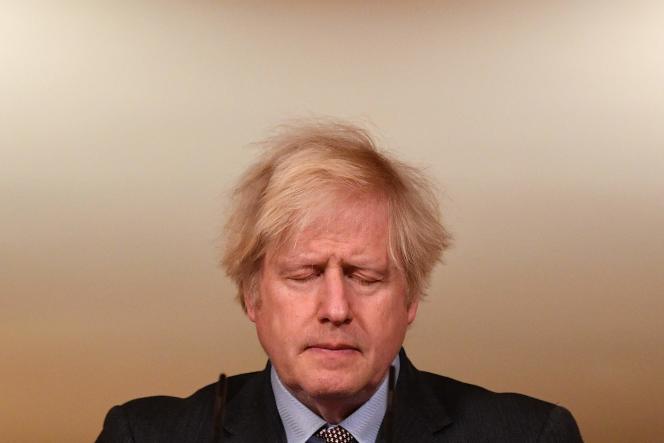He saved his post on several occasions but on Thursday July 7 British Prime Minister Boris Johnson announced he was stepping down as leader of the Conservative Party – he plans to remain in Downing Street until a successor is found. be appointed. Since becoming prime minister in July 2019, Johnson has seen a series of scandals, ministerial resignations amid inflation and social unrest.
Mr Johnson admitted he made a “mistake” in appointing Chris Pincher Deputy Chief Whip (responsible for parliamentary discipline for Conservative MPs) to his government in February. The latter resigned on June 30 following accusations of touching two men.
After asserting the opposite, Downing Street admitted on Tuesday July 5 that the Prime Minister had been informed as early as 2019 of old accusations against Mr. Pincher, assuring that he had “forgotten” them.
This umpteenth scandal was the final straw for Health Minister Sajid Javid and Finance Minister Rishi Sunak. They resigned on Tuesday, leading to a dozen departures at several levels of government.
Between May 2020 and April 2021, when the British had to remain cloistered at home on several occasions due to the Covid-19 epidemic, festive gatherings (aperitifs, leaving drinks, garden parties) were regularly organized in Downing Street, a scandal known as “partygate”.
British police investigated and issued 126 fines, including one to Mr Johnson, finding he had broken the law. Unheard of for a prime minister in office.
Senior civil servant Sue Gray has made a damning report for power, supporting photos. She described a series of extremely drunken gatherings, with altercations, discreet departures through backdoors in the early morning and sometimes a lack of respect for security or maintenance personnel.
Mr Johnson said he took “full responsibility for everything that happened”. But his image has suffered.
Inflation at its highest for forty years, at 9.1% in May over twelve months, has seriously damaged the popularity of the Conservative government, accused of inaction by the opposition.
Soaring food and energy prices, worsened since the start of Russia’s invasion of Ukraine, are expected to worsen further in October when the energy price cap is raised sharply in the UK.
The person who will succeed the two finance ministers who have successively resigned in recent days, Rishi Sunak and Nadhim Zahawi, will have the delicate mission of tackling this cost of living crisis.
Mr Johnson has been criticized for his chaotic handling of the Covid-19 pandemic, which has claimed nearly 178,000 lives in the UK, one of Europe’s worst-hit countries. He was notably accused of having delayed taking action in March 2020 and of having insufficiently protected residents of nursing homes.
He also suffered a revolt in his own camp when ninety-nine Conservative MPs voted against the establishment of a health pass for major events, deemed liberticidal, a measure finally adopted thanks to the voices of the Labor opposition. . Party-wide, only former Prime Minister Theresa May had seen worse since World War II.
Mr. Johnson launched a vast vaccination campaign in December 2020, one of the most massive in Europe, which he highlights in his defense.
The lucrative lobbying activities of some elected Conservatives have been singled out. MP Owen Paterson was implicated for having lobbied the government for the benefit of two companies that paid him.
Mr. Paterson, a former deputy minister for Northern Ireland, was paid almost £9,000 a month (about 10,000 euros) by two companies to plead their case with the government. One of the two companies, the pharmaceutical laboratory Randox, won juicy public contracts at the height of the pandemic crisis.
In November 2021, by wanting to change the rules to avoid a suspension of Parliament, Mr Johnson caused an outcry and had to backtrack. These cases have fueled accusations of corruption by the opposition.
Mr. Johnson said he paid “personally” for the luxurious renovation of the apartment he occupies with his family at 11 Downing Street, which is more spacious than 10, his official residence. But he did not specify that he had received a loan from a rich backer – then repaid in full.
The Prime Minister was called to order in December 2021: the electoral commission, which regulates the accounts of political parties, imposed a fine of 16,250 pounds (nearly 19,000 euros) on the Conservative Party for not having declared the total amount of the loan received to finance this renovation.
According to the commission, the Conservative Party received nearly £68,000 (about $80,000) from Huntswood Associates Limited, a company run by a close associate of the party, in October 2020, “including £52,801.72 ] were to cover the cost of three bills relating to the refurbishment of Downing Street”. Of this amount, only £15,000 was declared as a loan by the party.
After his victory in the 2019 legislative elections, Mr Johnson and his fiancée, Carrie Symonds, enjoy a luxurious stay in the Grenadines archipelago offered by businessman David Ross, founder of the former group Carphone Warehouse mobile phone company and Conservative Party donor. The commission of the Lower House of Parliament is formal in its report: no breach of the rules was committed by the Prime Minister. However, the commission regrets that the “informal” arrangements to finance this stay were not communicated in detail, MM. Johnson and Ross having given no information on the subject.

















